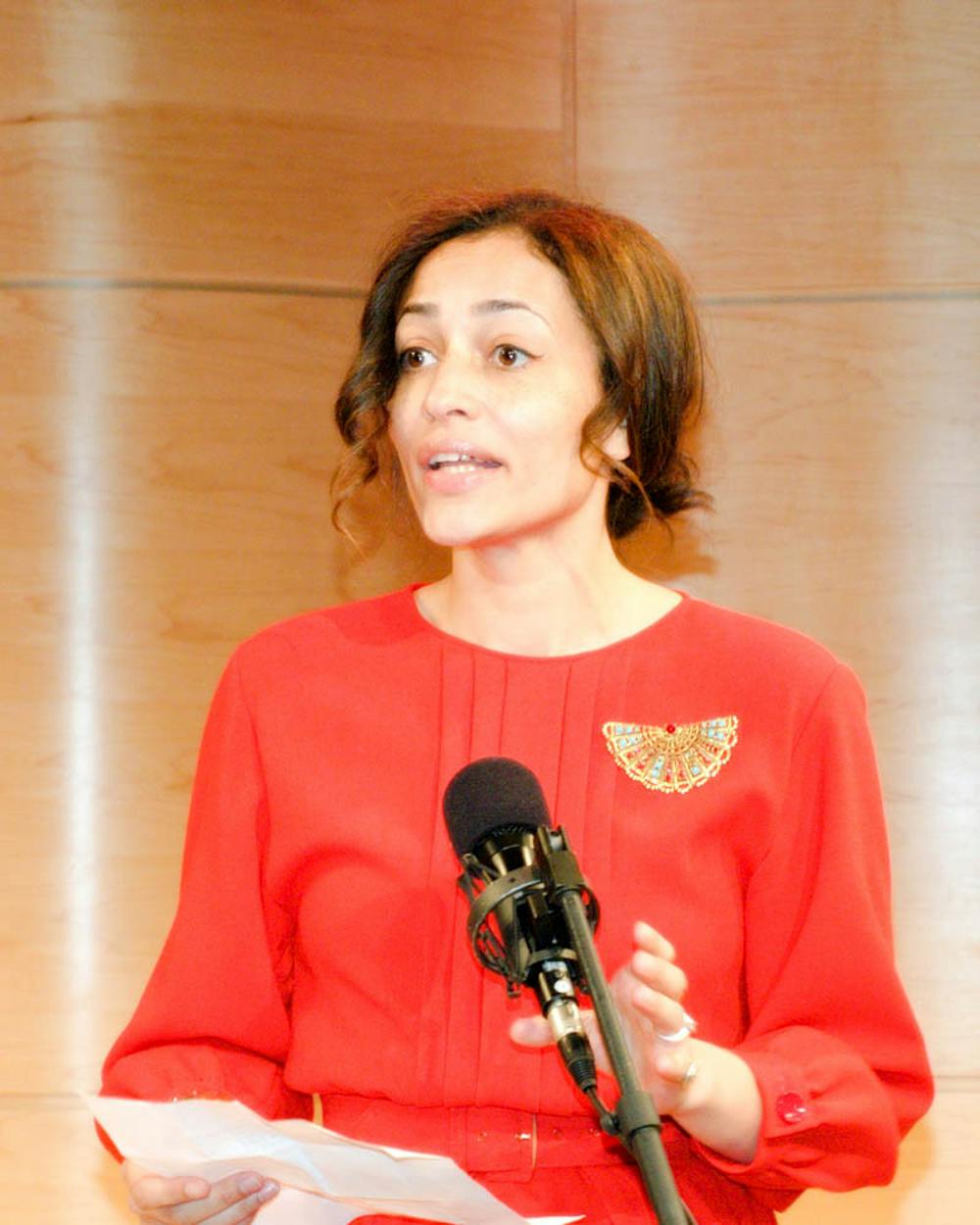Justin Bieber and Zadie Smith have more in common than one might think.
The critically acclaimed British author walked onto the stage in the Granoff Center for the Creative Arts’ Martinos Auditorium Tuesday and announced that Bieber recently said he does not want to participate in any meet-and-greets. Prior to the event, Smith expressed a similar sentiment, saying she did not want any exclusive interviews with the press. As it turns out, Bieber and Smith both share a dislike for petty conversations that will be relegated to the past the instant they occur.
Smith started the reading with a carefully crafted analytical essay of Bieber as a “love object” and Jewish philosophical figure Martin Buber’s concepts of “I-it” and “I-thou.” In her essay, Smith conveyed her interest in Bieber, as he is not a normal person but rather a “love object.” Any relationship Beliebers have with him is akin to an “I-it” relationship, a term defined by Buber as a relationship to an object or thing.
“Buber explains that with this ‘I-it’ attitude, we find ourselves in a relationship with things,” Smith said. She became dark and genuine when she expanded the idea of the “I-it” relationships to most aspects of our lives, saying that “most people don’t meet their best friends; mothers don’t always meet their children; husbands don’t always meet their wives.”
Smith explained how the artificial meet-and-greet with Bieber applies to many relationships people have with those closest to them. She said that people do not truly know someone as well as they should because they treat the relationship as one with a thing rather than one with a person. “Other people project themselves as objects in our way,” she added.
It is the genuine relationship with a human being, rather than one with a perceived object, that is the most pure, Smith said. She explained this as Buber’s concept of the “I-thou” relationship, saying that Bieber’s shallow conversations are “an extreme example of our experience with other people.” In these “I-thou” relationships, “you are uniquely attentive to the present time,” Smith read.
The British author closed her essay by stating that while she is not a Belieber, she does not “want him deported to Canada.”
Smith abruptly changed gears into a short story she wrote recently, titled “Two Men Arrive at a Village.” The story will appear in The New Yorker this summer.
“Two Men Arrive at a Village” is reminiscent of Italo Calvino’s novel “Invisible Cities,” in which Marco Polo tells Genghis Khan of his travels across Eurasia. In Smith’s story, two unnamed men, one “tall and handsome in a vulgar way” and one “small and weasly-faced” migrate from city to city with no destination in sight. The rationale for the duo’s migration is ambiguous, but “fear is always the greater part of what they want.” In each place, the men intrude upon locals, using their electronics, eating their food and inciting physical violence.
The story culminates in an incident in which one of the men gruesomely takes a knife and “splits a child from his life.” The band of women surrounding the incident grows both infuriated and terrified. As Smith read, “once blood has been shed, a kind of wildness descends.”
Smith finished reading the short story and concluded her talk with questions from the audience. In the discussion, Smith reiterated her unease with fame, saying that “the idea of having readers — that’s a strange concept.” The audience also learned more about Smith’s personality and her life. Since the age of 19, her days have been monotonous in that she goes alone to the library and writes all day, she said. She added that since she recently started a writing project with her husband on Fridays, it is “the one day in which I actually talk to someone during the daytime.”
Smith also touched upon how her childhood has shaped her writing, saying, “I grew up in a radically atheist household, so I have this weird fetish of other people’s beliefs.” For example, in her novel “The Autograph Man,” Smith looks at Judaism, in “On Beauty” she explores Protestantism and in “White Teeth” she examines Islam.
Smith’s interests and pursuits have drastically evolved since her first novel, “White Teeth,” which she wrote when she was only 21, she said. Smith admitted that she “honestly doesn’t remember the characters” from “White Teeth.”
Though Smith has changed since authoring her first novel, “White Teeth” has helped the author begin to attract readers. “White Teeth” first sparked the interest of Joanna Howard, professor of literary arts, back in 2000. Howard said that she was working in a bookstore when “White Teeth” came out and was immediately drawn to Smith’s work.
Smith candidly remarked on the process behind writing fiction. “In fiction, I don’t always know what I want to elicit.”
The author said, “I have to be doing something (all the time), and writing is doing.” When not writing, she enjoys spreading her passion of writing to her two young children. “It’s been really fun rereading Roald Dahl for the last six years,” she said.





